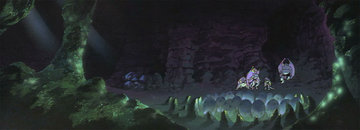Difference between revisions of "Rookery"
(→The Wyvern Rookery) |
(→Rookery Generations) |
||
| Line 9: | Line 9: | ||
==Rookery Generations== | ==Rookery Generations== | ||
| − | Gargoyle eggs hatch in the rookery every 20 years (those years ending in 18, 38, 58, 78 and 98). Each rookery generation is raised together by the | + | Gargoyle eggs hatch in the rookery every 20 years (those years ending in 18, 38, 58, 78, and 98). Each rookery generation is raised together by the clan. The closest biological relation between two gargoyles in a rookery generation is first cousins. Although none of the gargoyles are biological siblings, they view each other as rookery brothers and sisters. For instance, all the gargoyles hatched in the Wyvern rookery in [[938]], including [[Goliath]], [[Demona]], [[Othello]], [[Desdemona]], [[Iago]], '''and [[Hyppolyta]]''', are rookery siblings, though none of them are closely related. Similarly, all of these gargoyles look at [[Hudson]] as their rookery father because he fathered an egg in their rookery generation. [[Angela]], [[Gabriel]], [[Ophelia]] and the rest of the [[Avalon Clan]] look at Goliath, Demona, Othello and Desdemona as their rookery parents. |
Gargoyles tend to choose mates from among their rookery brothers or sisters, though this is not always the case (See [[Broadway]] and [[Angela]] '''or [[Yama]] and [[Sora]]'''). | Gargoyles tend to choose mates from among their rookery brothers or sisters, though this is not always the case (See [[Broadway]] and [[Angela]] '''or [[Yama]] and [[Sora]]'''). | ||
Revision as of 18:09, 11 February 2007
Rookery - A protected area where gargoyle clans store their eggs until they hatch.
The Wyvern Rookery
The rookery of the Wyvern Clan was a cave below Castle Wyvern with at least one entrance that led into the Castle's courtyard. It contained several "nests" (see picture to the right) that held the actual eggs. There was faint illumination provided by a sort of mold growing on the walls and pillars of the cave; this implies that the rookery may have been quite damp. The rookery was very old, and Castle Wyvern had actually been built on top of it, as was often done in gargoyle/human alliances. By 1996, due to time and the removal of the Castle, the Wyvern rookery was little more than a rocky pit.
Rookery Generations
Gargoyle eggs hatch in the rookery every 20 years (those years ending in 18, 38, 58, 78, and 98). Each rookery generation is raised together by the clan. The closest biological relation between two gargoyles in a rookery generation is first cousins. Although none of the gargoyles are biological siblings, they view each other as rookery brothers and sisters. For instance, all the gargoyles hatched in the Wyvern rookery in 938, including Goliath, Demona, Othello, Desdemona, Iago, and Hyppolyta, are rookery siblings, though none of them are closely related. Similarly, all of these gargoyles look at Hudson as their rookery father because he fathered an egg in their rookery generation. Angela, Gabriel, Ophelia and the rest of the Avalon Clan look at Goliath, Demona, Othello and Desdemona as their rookery parents. Gargoyles tend to choose mates from among their rookery brothers or sisters, though this is not always the case (See Broadway and Angela or Yama and Sora).
Apocrypha
Among the Wyvern Clan at least, a common punishment for young gargoyles that have caused trouble is to be sent to the rookery. The Trio was particularly embarrassed when they were sent to the rookery by Goliath as young adults in 994, though this action ended up saving their lives. At the time, Broadway commented that he had not been in the rookery since he hatched, which suggests he was either being sarcastic, forgetful, or, most likely, had managed to stay out of trouble throughout his childhood.
Some have theorized that the gargoyle urge and need to have a protectorate of some sort evolved from the long-term, vigilant protection of a clan's rookery, and the surrounding area, and thus the next generation. Indeed, Greg Weisman has said that gargoyles use the term 'rookery' to refer to their entire home, not just the place where the eggs are placed.
